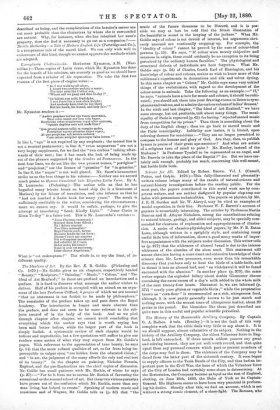Exemplaria Cheltoniensia. Ilerbertus Kynaston, A.M. (Mac- millan.)—These copies of Latin
verse, which Mr. Kynaston has done for the benefit of his scholars, are scarcely as good as we should have expected from a scholar of his reputation. We take the first two stanzas of the first piece of elegiac verse :— " As I was wallenc all alone,
I heard twa corbies making a mane ; The tune unto the Vother say,
' Where sail we gang and dine to-day r•
'In bebint you auld, frail dyke, I wot there lies a new-slain knight ; And naebody kens that he lies there But his hawk, his hound, and lady fair,' "
.Mr. Kynaston renders it :— " Audivi geminos corvos ego yaws querentes, Dam colas minor per loca sole tagor.
Rerpiciens vetus aequaevum rogat alter amicum, ' Optatis dapibns sors crit nude LIU?'
'Qua procal egged° tollit se.caespite moles,
Porngltur caesus gramme nuper eques, At quo projieitur soli novere cadaver
Cam catulo accipiter sponsaque false. locum.'" In line 1, "ego" is not required by any emphasis ; the second line is not a musical pentameter ; in line 3, " vetus aequaevum" are not a very happy supplement, for we find the " twa corbies " talking after- wards of their nest ; line 4 hes much the look of being made up out of the phrases suggested by the Gradus ad Parnassum. In the next four lines, we do not like the two present tenses, " porrigitur " and " projicitur," nor the licence of " gramine " for "in gramine." In line 6, the " nuper" is not well placed. Mr. Snow's hexameters strike us as the best things in his volume.—Neither can we accord much praise to Hymns translated into Rhyming Latin Verse. By A. M. Luscombe. (Pickering.)—The author tells us that he has beguiled many leisure hours on board ship (he is a lieutenant of Marines) by the labour of translation, and also informs us that he "had not touched a Latin book for many years." The result is sufficiently creditable to the writer, considering the circumstances ; more we cannot say. It would be unfair, perhaps, to give the attempt at translating "Lead, Kindly Light." "Jesus Christ is Risen To-day" is a fairer test. This is Mr. Luscombe's version :— " Jesus Christus resurreait ! Quisque diem hum dilexit ; EnI dolore cruciaA
Nos illius redemptati ! Regi Christe coeli, terra° Hymnos laudis fas eat (erre : Pass= Crucis qui angores Est redemptum peccatores! Bed salutifer fit Crucis
Dolor nobis 1111 trpcis! Nano in cede eat caelorum, Inter chores Angelornm."
What is "eat redemptum ?" The whole is, to say the least, of in- different quality.


































 Previous page
Previous page